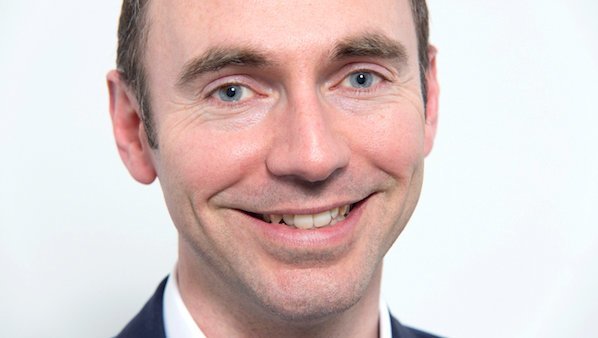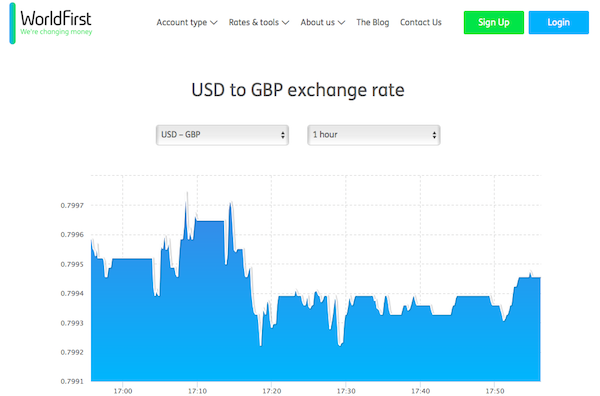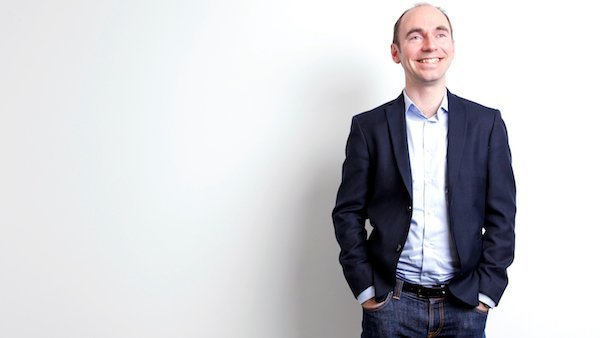FXcompared founder and CEO, Daniel Webber, recently sat down with World First's founder and CEO, Jonathan Quin. Jonathan shared the story of the very beginnings of World First, explaining how customer service has been at the core of what World First does since its inception. He also spoke in depth about the future of the money transfer industry and his recent decision to move away from currency options. Finally we covered what changes he sees on the horizon, driven by technological advances and emerging financial trends.
Daniel: What led you to found World First?
Jonathan: I always knew I wanted to run my own business. When I was in school, I sold number plates and I loved it; and from that moment onwards it’s what I wanted to do. But even though I knew I wanted to start my own business, at the time I was coming out of university, it was quite unusual to graduate and immediately set up a business. Following graduation I went into the city and worked for Citibank and RBS, but I vowed I would get out by the time I was thirty - that was my trigger age - and I got out by twenty-nine, aiming to start my own business.
I looked at five different business plans one of which was the foreign exchange idea. Nick, whom I met at Citibank, and I had talked about the foreign exchange business model a number of times and I kept coming back to it as the best idea. In 2003 Nick and I met up to discuss it and we both decided we would pull the trigger, and we founded World First, in January of 2004.

Daniel: What do you think set World First apart at the beginning and what now sets it apart from its competition?
Jonathan: In the beginning, we mystery shopped some of the companies that existed then, and though they gave good service, we realized it was very manual and paper driven. At that point, no one had an online system and the salespeople were quite jargony and pushy. We realized what we needed to do was hire really nice people and teach them foreign exchange, rather than hiring foreign exchange traders and teaching them to be nice. So that’s what we did, we hired people we thought were the kind of people you really wanted to speak to who met five criteria - nice, friendly, bright, professional and proactive. We felt that combination of attributes would result in really good customer service. And, though it’s hard to get data on this, I personally believe we probably had higher customer retention because of our customer service. Fast forward to today, and according to online feedback forums, I think we still have the highest positive feedback with 98% (from Feefo review site.) I believe if you give exceptional customer service, the customer comes back and you build a relationship for life. This leads to more referrals and more growth. That would be my first point, in the initial differentiators of World First.
Following that, I think we pushed the corporate business further and faster. We made a concerted effort in 2005 to grow that and today it’s 88% of our business. We got into the ecommerce space in 2006 and we focused quite a bit on that. Beyond this, I believe technology has been a key driver that sets us apart. I know today everyone has fairly comparable systems, but we were one of the first online platforms and our backend is pretty efficient. This enables us to run an efficient service, and going back to customer service, if we tell a customer we are going to do something, we make sure we do that and the technology allows us to.

Daniel: And what are the technology trends that you think will have the most impact on the international payment space over the next five years and which are the ones that you personally think are the most interesting?
Jonathan: Yeah, so this is hard to summarise - I have a very long answer for this! But, I think the three that you mentioned earlier, blockchain, mobile and APIs are definitely three of the main ones, and also security.
On blockchain:
I actually wouldn’t be surprised if blockchain wasn’t as widely used within five years as some people predict, but I think it will have some very specific and valuable applications. I think blockchain may be one of those things that will take longer than people anticipate to get started, however once it is started, it will happen very quickly. To me, blockchain is about speed and security.
On Security:
And on that note, the next most important thing I would have on the list of future changes in the space would be security. It’s just crazy that we are in a situation where we have all the bits of technology to avoid fraud and yet, it’s still absolutely rife and I believe the issues surrounding security will really transform what we can do. If we can know who we are talking to electronically and therefore know from a KYC perspective that it’s not fraudulent, we can speed things up and do things more cheaply. I think eventually the whole banking world will do that and we will be seeing that in the next five years. We are already looking at biometrics on your device that will be able to very accurately verify who you are, enabling banks and service providers to immediately treat you as a certified customer and speed financial transactions and processes up.
On Mobile:
Mobile is absolutely key. Today, Google is not saying “mobile first,” they are saying, “mobile only” We need to make sure we follow the trend toward mobile, but we also need to have the timing of it correct. While mobile is definitely the future, if we look at current customers, many of them still use a desktop. We want to lead in mobile, but make sure we still give customers what they want. Gently lead them but not drag them to mobile!
On APIs:
APIs clearly are key, in fact, even within our business we are rebuilding bits of our backend so there’s not one platform, there are individual APIs talking to each other. The benefit to that is that you can work on things in a more agile way and those APIs can be internally facing or externally facing, which is key. Eventually, the banks will start to separate out some of what they offer and as they start to offer APIs it will enable companies like World First to do discrete parts of that process. That will be transformational to the industry, because some providers like us will be able to do certain parts of that business better than the bank can, or more cost effectively. The bank is very good at providing a mass service, but it has to take a sort of mass approach toward prioritization of product building, whereas I think individual companies will be able to solve individual problems and attach them to the bank backend infrastructure and provide those services out, and that will drive a lot of innovation.

Daniel: On the topic of international markets, what are your observations on the differences and similarities in the key global centers - North America, the UK and Europe and Asia?
Jonathan: We love to bash the banks in the U.K., but when you go international you realize that the systems and the speeds and costs in the U.K. are actually pretty good for most things. We expect free banking, we expect to be able to pay someone instantly and we don’t expect to be charged to receive money. In that sense, the U.K. is a very good place for financial services. Europe is pretty similar to the U.K. The average man in the street in Europe has less of a multicurrency banking motive than in the U.K. The U.K. truly is one of the most international of client groups. Britons know/get exchange rates, think about them, talk about them and I think in some European countries that’s far less the case.
North America is fascinating because it’s so far ahead technologically, in some areas, and they drive a lot of technological innovation, and yet there’s a huge number of checks floating around. To this day with many American banks, if you make an e-bill payment, they print a check and put it in the post. That’s obviously an area ready for mass change, and I know in the U.S. they are working on faster payments or similar initiatives to faster payments. This is going to be transformational for the U.S., because it will speed everything up there. Currently, in the U.S., we have a situation where if I want, I can pay someone in less than a minute, but if they want to send the payment back to me, it can take up to five days.
Asian markets are interesting because within their own countries there’s a lot of innovation, such as in Singapore, who have the same backend payment platforms as us. However, between Asian markets there’s still a lot of protectionism around rules, inflow and outflow of funds, etc. Malaysia, China, India, etc all have restrictions on the movement in, and generally out of their country. I believe in the next five years, some of these regulations may change and that will be another pivot point of significant transformation.
Daniel: You very recently dropped the options as a product line for the company. What led you to do that? What do you think other players in the market may end up doing - will they follow suit?
Jonathan: We always analyze our business, and when we looked at currency options, we realised, not only was it using up a lot of time, it was using up half of our capital for 10% of our revenue. Further to that, we felt that some of the regulations coming in are going to make it even harder to offer our customers the service we wanted to offer, and it just didn’t fit with our goal of focusing on efficient, straight through processes and automated products. I wouldn’t be surprised if a lot of people follow suit in that, particularly as we get closer to the MIFID 2 launch and I think that some people reassess the capital requirements of those products under that environment.

Daniel: What role do you see banks having in this next phase, in the next five years? As you say, there’s been lots of bank bashing and that might not be completely fair.
Jonathan: Yes, there will absolutely still be a role for banks in the next five years. All of the challengers to banks are coming in and saying, “well I’ll have 5% of this market in five years,” and if you add that together...personally, I don’t think they are going to get there. That’s not to say that the challengers will not have some impact. The banks have built, and own, some massively complex backend processing infrastructure and I’ve mentioned this before, but I don’t see fintech and startups coming in and trying to rebuild the bowels of banking. Startups and fintech are going to be coming in and focusing on the customer layer. The banks will continue to hold on to that core infrastructure and will work out methods to charge for that infrastructure via APIs and they will enable independent or fintech kind of companies to offer services as a layer on top of that underlying infrastructure. I think you can already see that in some things that have happened in the space; many Fintech companies are doing innovative things in financial services, but they still absolutely have to have a bank underneath that.
Daniel: Great - lets move on to a recent big acquisition where Alibaba came in and bought MoneyGram. Do you expect to see more of these acquisitions, and from what types of buyers? Obviously, Alibaba/Ant Financial is an interesting buyer for MoneyGram.
Jonathan: Absolutely. The buzz around payments and the opportunities presented are because we are at transformation stage, which will continue to lure in businesses that traditionally would not have considered financial services. And I’m absolutely sure that all the big companies in the space, the Googles, the Apples and so on, I’m sure they are all considering, “How can we improve things that people do during their days?” Payments is one of those things that can be improved. And now the average customer has this device, they are carrying this piece of technology, that is absolutely becoming their wallet. Why would anyone carry a card when they’ve got their device as a way to store that same data? I definitely think we’ll see new people coming in, rather than attempting to build infrastructure from scratch, they can try to short circuit to offering that product by acquiring the licensing and the infrastructure and systems required to do that from businesses already in this space.
Daniel: You say that it’s a transformational time, what’s the trigger that you count as the transformation, because we’ve had a lot of transformation in this space to date already?
Jonathan: It’s been happening here for a while, but if you look at it globally it’s the electronicization of payments. We’re moving away from cash to electronic money. I definitely preach at the altar of cashless, contactless payment systems.
Daniel: Which, by definition then you would say we’re really early on then, because we are still walking around with our cash.

Daniel: Just to touch on the security issue. A lot of people see this moving to entirely open source, you’ve got the app and you’ve got the APIs and then at the backend it’s in the cloud. If that’s where the cost model is driving the market, that’s surely going to mean huge implications for security and for transformation.
Jonathan: Yes, I think it is and I think it’s so important to get that right. In the end, there’s nothing that will bring a tech company down quicker than a data breach.
Daniel: Those are the issues that all of these companies are facing. 60-70% of those fintech companies are here and they’re all looking at all - of their podcasts and all of their chatter is all around that area. And as you said earlier, the challengers will layer themselves on top. It has got to be an evolution, it’s not going to be a revolution, they’re going to evolve into the legacy world.
Jonathan: We were initially in a situation where a signature on a check was the only way to verify that a check was legitimate. We then moved to a situation where a four digit number was the next step to verify a transaction. We are now reaching the point where we have multiple data points, and we are able to add these all together to determine whether a transaction is legitimate. Data points such as the location of the device, the cookie in the device, the biometric verification on it – we now have the data on whether it fits the pattern of what a customer does. I think piecing all of these things together will help that, but it’s also an area of innovation that we need to get better at working out if the customer is really the customer and not fraudulent.
Daniel: Finally, what do you like to do outside of work?
Jonathan: We like to escape as a family.We have a holiday house on the Isle of Mull in Scotland, it’s in the middle of nowhere, there’s no mobile signal and we go walking or out on the water.
Learn more about World First.

Oanda CEO Vatsa Narasimha On the Future of Money Transfer

Mike Massaro, Flywire CEO Interview - On Money Transfers and Receivable Payments






